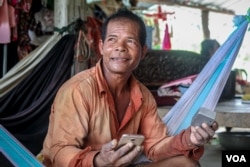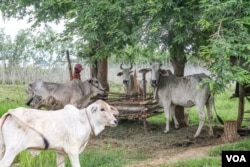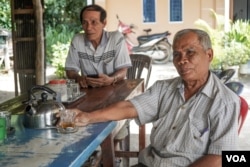RADIO SILENCE : PART TWO
STORY BY SUN NARIN & KHAN SOKUMMONO
EDIT BY ANANTH BALIGA
Editor's Note: In the second story of the ‘Radio Silence’ series, VOA Khmer reporters look at how the shuttering of independent radio news broadcasts has not only left rural Cambodians less informed but it also increased the cost of accessing such news.
Where once a cheap transistor radio was all one needed to access the preferred Khmer-language news broadcaster, now more Cambodians are being forced to try to jump on the digital bandwagon to get their daily news.
PREY VENG AND BATTAMBANG PROVINCE, Cambodia — Nga Ruot is very pleased with her family’s latest purchase. For the first time in 58 years, the experienced rice farmer owns a radio, gifted to her by a daughter who works at garment factory in Kandal province.
The $6 piece of equipment may not seem like much, but owning a radio is a valuable commodity in Cambodia’s far-flung districts. The drone of the Buddhist dharma, where monks recite ancient teachings, fills Nga Ruot's house in Battambang province, as she takes care of her grandchild.
Nga Ruot isn’t particular about what she listens to, despite the same daughter, Pha Bona, wanting her mother to listen to the news and keep in touch with events around the country.
“[I] want her to listen to news and know how our society is going now,” Pha Bona said.
Changing media landscape
Radio news broadcasts are the primary source of information for a large swathe of Cambodians in rural areas, many supporting families by fishing or subsistence farming. However, for the last two years there has been little independent news coverage easily accessible on the airwaves.
If we listen to news, we will have knowledge. We are able to think. If we don’t listen, we don’t know anything.”
In 2017, the government shut down radio frequencies broadcasting Khmer-language programming from Radio Free Asia (RFA), Voice of Democracy (VOD) and Voice of America (VOA), under the guise of administrative violations. The government also labelled these organizations as part of a “color revolution” aimed at overthrowing the Cambodian People’s Party government.
This left many Cambodians with almost no access to critical, analytical news coverage and, in the process, diminished the value of owning a radio in rural Cambodia.
Nga Ruot said she was unaware of the radio station crackdown, but her husband, Sum Pha, did hear of the political events in 2017, on a neighbor’s radio. Both confess to barely listening to the news on the radio, but are still aware of its benefits.
“If we listen to news, we will have knowledge. We are able to think. If we don’t listen, we don’t know anything,” he said.
Soon after the closure of radio stations, some broadcasters emphasized or pivoted to AM transmissions and increased their reliance on live or recorded news bulletins on Facebook – the social media site has a sizable user base in Cambodia. Neither could provide the same audience reach that FM broadcasts afforded to these broadcasters.
A possible reason for this is that accessing the news became more costly.
While a radio can cost under $10 and give people access to over 150 radio broadcasts in Cambodia, a smartphone with basic features costs around $100, with the additional cost of 3G or 4G data connections. Network reach is also low, the further you get from provincial towns.
This has resulted in an exponential cost increase for rural Cambodians looking to access independent or critical news reports. Sometimes, if they can afford the equipment, they are unaware of how exactly to access VOA or RFA broadcasts on social media, villagers said.
And the growing concern among experts is that the dramatic changes to the media landscape will leave the country with an uninformed electorate.
Nga Ruot and Sum Pha grow vegetables on land they lease. They had a bad harvest this year. They said it was because of a lack of water. Yet they said they never received warnings about shortages.
Sum Pha, who tries to keep up with the news, said he was completely unaware that the European Union was considering suspending the ‘Everything But Arms’ trade preferences to Cambodia.
And it quickly struck him that suspension of the trade agreement would mean his three daughters’ jobs at the garment factory were at risk.
“If [factories] close, my daughters won’t have work and salary,’’ Sum Pha said. ‘’Life at home here will be in misery.’’
Lack of Information
The lack of information flow is not surprising given that all major television channels, newspapers and radio broadcasters are owned by affiliates of the government. One of Cambodia’s biggest TV networks and radio broadcasters is owned, for example, by the prime minister’s daughter, Hun Mana.
News is like their breath. Losing news is like losing oxygen.”
In the days leading to the 2018 national election, 17 publications were preemptively blocked because the government feared they could publish provocative content. This meant that Cambodians had access to only pro-government publications for the three days prior to election day.
Another example of selective publication of news was evident in August. Two local NGOs published a report on human rights violations in the microfinance sector. Most pro-government publications did not publish the findings, but were quick to file stories about the government slamming the report.
Back in Battambang, Sum Pha’s neighbor, Hun Mao, is unhappy with her rice crop, again blaming a lack of water for the harvest’s failure. She said she heard no news or information about the lack of water.
“They only report about the villages near the stream, but [my village] here is far,” said the 55-year-old farmer and vegetable vendor.
Nop Vy, from the Cambodian Center for Independent Media, said the lack of news diversity was affecting Cambodians’ abilities to make decisions, whether it be about when to plant their crop or the opinion of political developments.
He added that citizens had a right to access information, the lack of which was stifling public discourse, especially in the rural areas.
“News is like their breath. Losing news is like losing oxygen,” Nop Vy said.
It is clear that Cambodians had benefited from a diversity of media voices in the past, said Cambodian observer Sebastian Strangio, be it an array of pro-government, pro-opposition and independent publications.
“We don't discriminate”
But following the events of 2017, the government had successfully ensured only their political narrative remained in the public sphere, though there was hope in the online space, said Strangio, who is also the author of “Hun Sen’s Cambodia.”
“One positive is that people can access pretty much whatever they want online, including less biased (or differently biased) news, but of course Hun Sen and the Cambodian government have moved aggressively into that sphere as well,” Sebastian Strangio said.
If we don’t know the news, we are just following orders.”
Government spokesperson Phay Siphan was dismissive of concerns relating to news availability for rural Cambodians, and pointed to his own interviews with RFA and VOA Khmer to suggest there was no political bias against them.
“I still cooperate with VOA and RFA in giving interviews,’’ Phay Siphan said. ‘’We don’t discriminate. Villagers are currently able to listen to news online freely.”
As farmers in Battambang province make the slow transition to embrace the digital medium and regain access to their preferred news broadcasts, it is a similar situation in Prey Veng province.
In Romleach commune, Ann Arth bought his daughter a smartphone as a study aid. He is aware that the phone has an internet connection but has not asked his daughter, Arth Chantheng, to play RFA and VOA news clips.
Ann Arth hesitancy comes from an instilled fear of listening to these broadcasters. That simple act could land him in trouble with local authorities.
Fortunate for her, Arth Chantheng learned to access the RFA and VOA Facebook pages, and now helps her father listen to these news reports regularly.
“If I had to ask the government for one thing, it is to just allow those radio stations back. It is easier for old people to listen to,” said Ann Arth, 48.
“If we don’t know the news, we are just following orders.”
Editor's Note: In the third and final story in the ‘Radio Silence’ series, VOA reporters look at how the media crackdown has affected the people who report the news every day. While some have lost their jobs, others have paid the heavier price of being jailed.








